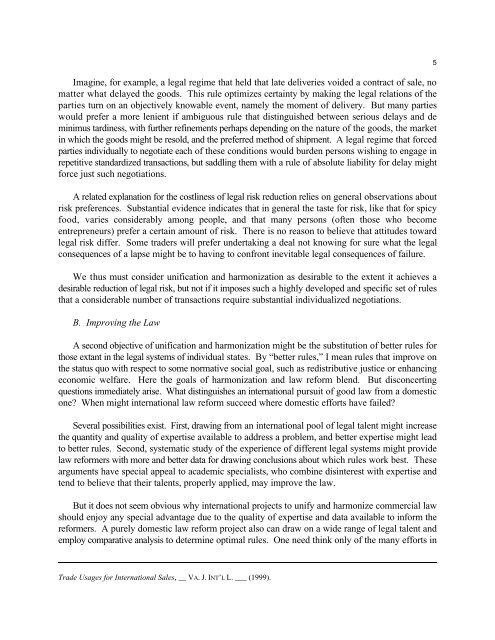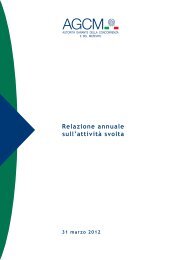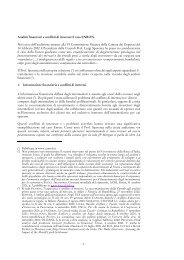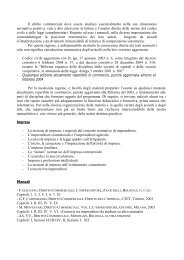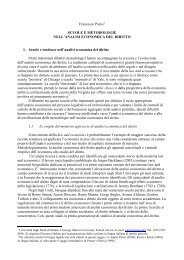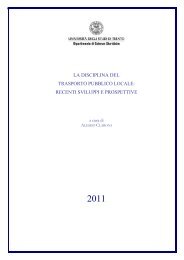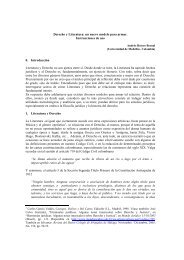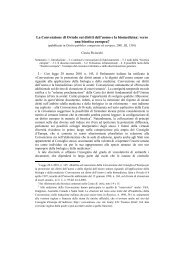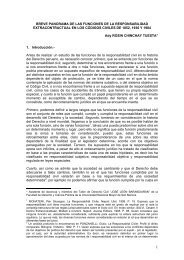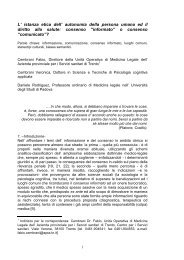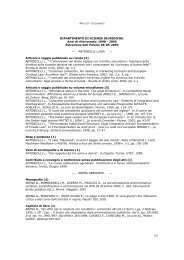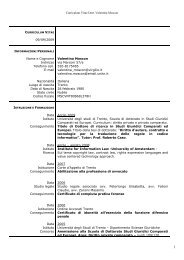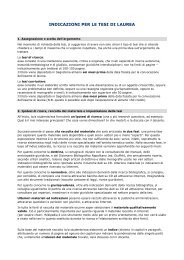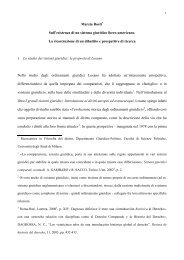The Futility of Unification and Harmonization in International ...
The Futility of Unification and Harmonization in International ...
The Futility of Unification and Harmonization in International ...
You also want an ePaper? Increase the reach of your titles
YUMPU automatically turns print PDFs into web optimized ePapers that Google loves.
Imag<strong>in</strong>e, for example, a legal regime that held that late deliveries voided a contract <strong>of</strong> sale, nomatter what delayed the goods. This rule optimizes certa<strong>in</strong>ty by mak<strong>in</strong>g the legal relations <strong>of</strong> theparties turn on an objectively knowable event, namely the moment <strong>of</strong> delivery. But many partieswould prefer a more lenient if ambiguous rule that dist<strong>in</strong>guished between serious delays <strong>and</strong> dem<strong>in</strong>imus tard<strong>in</strong>ess, with further ref<strong>in</strong>ements perhaps depend<strong>in</strong>g on the nature <strong>of</strong> the goods, the market<strong>in</strong> which the goods might be resold, <strong>and</strong> the preferred method <strong>of</strong> shipment. A legal regime that forcedparties <strong>in</strong>dividually to negotiate each <strong>of</strong> these conditions would burden persons wish<strong>in</strong>g to engage <strong>in</strong>repetitive st<strong>and</strong>ardized transactions, but saddl<strong>in</strong>g them with a rule <strong>of</strong> absolute liability for delay mightforce just such negotiations.A related explanation for the costl<strong>in</strong>ess <strong>of</strong> legal risk reduction relies on general observations aboutrisk preferences. Substantial evidence <strong>in</strong>dicates that <strong>in</strong> general the taste for risk, like that for spicyfood, varies considerably among people, <strong>and</strong> that many persons (<strong>of</strong>ten those who becomeentrepreneurs) prefer a certa<strong>in</strong> amount <strong>of</strong> risk. <strong>The</strong>re is no reason to believe that attitudes towardlegal risk differ. Some traders will prefer undertak<strong>in</strong>g a deal not know<strong>in</strong>g for sure what the legalconsequences <strong>of</strong> a lapse might be to hav<strong>in</strong>g to confront <strong>in</strong>evitable legal consequences <strong>of</strong> failure.We thus must consider unification <strong>and</strong> harmonization as desirable to the extent it achieves adesirable reduction <strong>of</strong> legal risk, but not if it imposes such a highly developed <strong>and</strong> specific set <strong>of</strong> rulesthat a considerable number <strong>of</strong> transactions require substantial <strong>in</strong>dividualized negotiations.B. Improv<strong>in</strong>g the LawA second objective <strong>of</strong> unification <strong>and</strong> harmonization might be the substitution <strong>of</strong> better rules forthose extant <strong>in</strong> the legal systems <strong>of</strong> <strong>in</strong>dividual states. By “better rules,” I mean rules that improve onthe status quo with respect to some normative social goal, such as redistributive justice or enhanc<strong>in</strong>geconomic welfare. Here the goals <strong>of</strong> harmonization <strong>and</strong> law reform blend. But disconcert<strong>in</strong>gquestions immediately arise. What dist<strong>in</strong>guishes an <strong>in</strong>ternational pursuit <strong>of</strong> good law from a domesticone? When might <strong>in</strong>ternational law reform succeed where domestic efforts have failed?Several possibilities exist. First, draw<strong>in</strong>g from an <strong>in</strong>ternational pool <strong>of</strong> legal talent might <strong>in</strong>creasethe quantity <strong>and</strong> quality <strong>of</strong> expertise available to address a problem, <strong>and</strong> better expertise might leadto better rules. Second, systematic study <strong>of</strong> the experience <strong>of</strong> different legal systems might providelaw reformers with more <strong>and</strong> better data for draw<strong>in</strong>g conclusions about which rules work best. <strong>The</strong>searguments have special appeal to academic specialists, who comb<strong>in</strong>e dis<strong>in</strong>terest with expertise <strong>and</strong>tend to believe that their talents, properly applied, may improve the law.But it does not seem obvious why <strong>in</strong>ternational projects to unify <strong>and</strong> harmonize commercial lawshould enjoy any special advantage due to the quality <strong>of</strong> expertise <strong>and</strong> data available to <strong>in</strong>form thereformers. A purely domestic law reform project also can draw on a wide range <strong>of</strong> legal talent <strong>and</strong>employ comparative analysis to determ<strong>in</strong>e optimal rules. One need th<strong>in</strong>k only <strong>of</strong> the many efforts <strong>in</strong>5Trade Usages for <strong>International</strong> Sales, __ VA. J. INT’L L. ___ (1999).


